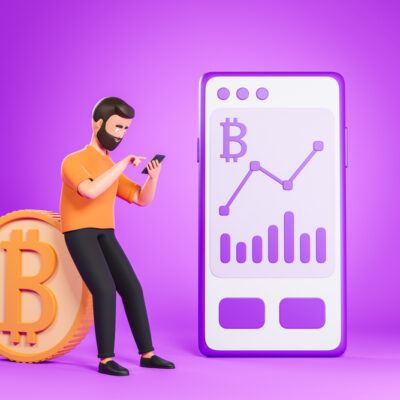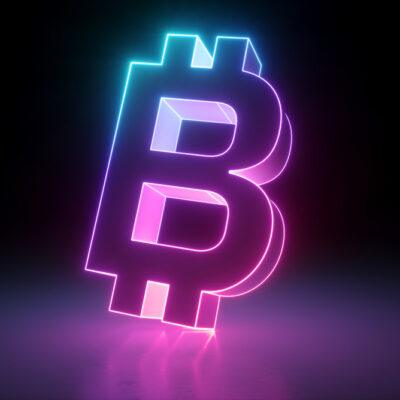
In late 2021, Facebook announced that they were changing their name to Meta, and that they wanted to help build the metaverse. About five seconds later, metaverse companies started to appear. These companies claim to be building the next phase of the internet. Many of these companies were issuing their own crypto tokens, and now many of these cryptocurrencies are available on popular exchanges.
So – what does all of this mean and does it have anything to do with Bitcoin?
There’s No Such Thing As The Metaverse
What The Metaverse Was Supposed To Be

In the book Snow Crash, governments of the worlds have lost power to mega corporations, and there is now a realistic, digital world called The Metaverse that people explore to escape their dismal reality. Rather than hang out in a tiny shoebox in your corporate-owned apartment building, you can hop into a custom avatar, go to parties, fight with samurai swords, and ride motorcycles. Sounds like a good tradeoff to me!
This digital world is so immersive and attractive that many people don’t want to leave. Some people just live their lives in the metaverse and become “gargoyles”, walking around the real world with portable metaverse gear strapped to their bodies disconnected from reality. While that sounds like a problem in itself, to get those gargoyles, first we have to get to the point where it actually sounds fun to live in the digital universe.
So far, the metaverse sucks.
Related Content
How Facebook Destroyed The Metaverse Name & Concept
Nobody cared about the metaverse until Facebook changed its name to meta and said they want to control build the metaverse. It was a cool science fiction concept that nerds would think about, and now nobody can say the word metaverse without bringing about Facebook. It’s pretty unfortunate that Facebook did this, because, well, everyone hates Facebook.
Not only do people hate Facebook the product, but they hate Facebook the company, and Mark Zuckerberg is not exactly someone I would trust to be the creator of the virtual universe. I certainly don’t want to live in a world crafted by Zuckerberg and his team.
Personally, I think it was a pretty shitty move by Facebook to co-opt one of the greatest and most interesting, futuristic sci-fi concepts. After reading Snow Crash, it was fun to just sit and think about what the metaverse would look like in the future. What would it be like to live in a digital world so realistic that you could barely distinguish between the real and computer generated world?
From Cyber Punk Dystopia to VR Boardroom
Instead, now I just think about how the metaverse will basically be a VR version of a Facebook account. I already hate the metaverse, and it doesn’t even exist yet.
While doing research for this article, I needed to look up exactly how the metaverse was described in the original Snow Crash book because I hadn’t read it for a few years and wanted to refresh my memory. Unfortunately, I couldn’t get away from all the hype and buzzword bullshit about Facebook. Facebook ruined the metaverse, and they haven’t even built it.
Honestly, I think that ultimately, nothing will come of Facebook’s rebrand to Meta, and we are still multiple decades from any type of basic, universal “metaverse” experience in virtual reality. Facebook’s concept of the metaverse will likely end up like their version of digital money, Diem, which is being sold off as infrastructure, since the project failed before it even launched.
The Metaverse & Crypto
Of course, the crypto grifters were not far behind, and now there’s a whole industry of metaverse companies, games, and tokens you can invest your money in. What’s crazy, is that the metaverse hype didn’t even exist as of 3 months ago, and there are already companies claiming to be metaverse companies. In fact, Coinbase Ventures claims that 9% of their portfolio is in NFTs and metaverse companies. How can this be 9% of your investment portfolio when it didn’t even exist 3 months ago?!

What The Hell Are Metaverse Tokens?
Guys. Listen. Metaverse tokens are some really dumb shit. We’ve already established that the metaverse doesn’t even exist, so how is there already virtual money for it? If I were to build a virtual world, “the money” is not the first thing I would build. I certainly wouldn’t build a free-floating currency based on new technology which is completely experimental and is unproven to work.
As a starter, I might go with a digital dollar, i.e. using a form of money that already works, or I’d go with an established form of digital money, i.e. bitcoin. What I certainly would NOT do is to create a new currency that is linked directly to the building of the digital world. One or the other. Not both at the same time.
Nobody Really Knows What Metaverse Tokens Actually Do
It’s a little unclear what these metaverse cryptocurrencies are supposed to do anyway. When you buy a metaverse token, what does that mean? What you are actually doing by investing money into purchasing these tokens is a blurred line.
On one hand, buying a token seems to be an entry ticket to play the game. You need the token to play, so you should buy a couple of tokens to extend the life of your gameplay.
On the other hand, these seem to be startup companies doing community fundraising by issuing tokens on the marketplace, then using the funds to develop the game. In this way, it seems that by purchasing tokens, you now own equity in a game development company
And still, a 3rd option appears possible, since owning tokens often comes with the incentive that users are giving some degree of (alleged) governance over the system, meaning more tokens equals more votes in the system. This “governance” system hasn’t really played out yet, and I’m very suspicious that it gives users of the game any legitimate rights to call the shots. Nonetheless, it adds to the murkiness of metaverse.
So, are you funding a company? Are you building a game? Are you investing in digital assets?
Looking at metaverse tokens available right now, 95% or more of them are just computer games. In my opinion, the reality is that most of the time you are just buying shares of a company that is building a video game with an in-game currency.
Metaverse Games Suck Or Are Not Real
There have been in-game currencies in computer games in the past, and they have worked to some degree. The most successful in-game token I can remember is World of Warcraft gold. There’s actually a really complex and interesting history of WoW gold worth reading about. The short version is that “gold” is earned within the game, and you can purchase in-game items to make your characters strong or journey easier.
You can earn gold by completing tasks and selling stuff within the WoW gold economy, and the exchange rate against real-life currencies fluctuates based on game dynamics.
At one point, World of Warcraft gold was so desirable that some players were making incomes from farming the gold, causing inflation. Many farmers were eventually banned, though more recently the price of the currency seems to have devalued enough that the buying and selling of gold in the game isn’t as big a deal as it used to be. I’m not a WoW gold historian, so some of the details are fuzzy to me, but if you want a real game that actually works and has an in-game currency, World of Warcraft is worth a try.
The key here is that the game actually works and is fun. The game came first, and the popularity of the token was an accidental secondary priority. Contrast that these crappy “crypto games” which are cropping up. It’s very obvious to see that they are doing things backwards, i.e. starting with a token they want to grow in price and developing a game to build interest in the project.
Lots of Metaverse Games Haven’t Even Launched
If you look up lists of metaverse tokens and metaverse games, many of them haven’t even launched yet. All you can see are some garbage demos and renders (not gameplay) on YouTube. Two examples of this are Cornucopias and My Neighbor Alice.
If you’ve ever bought into a crowdfunding project, you know that these things never arrive on time, or on budget, and many times don’t live up to expectations. What are the chances that these games are actually developed into full-fledged universes with diverse economies and a globally robust set of players?
I’d say the chances are close to zero.
Then, what are the chances that their in-game token isn’t charged by the SEC as an unregistered security, or that they don’t just peg it to a stablecoin?
I’d say the chances are pretty high.
What’s also becoming obvious is that even if one, or a couple of these games do turn into “online worlds”, they won’t be interconnected. There isn’t a single metaverse in development. There are multiple metaverses, which kind of defeats the purpose. In the original book, and even in Facebook’s perverted version of the metaverse, this would be a globally connected network, like the internet.
So far, what seems to be developing is a bunch of video games with custom avatars and loose (if any) connections to cryptocurrencies.
That’s Not Even A “Real” Metaverse
Some of these games aren’t even a “metaverse” by any stretch of the imagination. For example, if you look up metaverse games or metaverse tokens, you’ll often run into a game called Axie Infinity. This game doesn’t have a relationship to the metaverse at all, as far as I can tell. There’s no VR element, and there’s no open world gameplay. It’s like Pokémon where you have creatures fight each other, with the added element that you can grow and breed these creatures like Tamagotchi pets.

In my opinion, what’s happening is that content creators are incentivized to create content that gets clicks, so they are basically inventing the metaverse where it doesn’t exist. I don’t really think that the creators of Axie Infinity intended their game to be an immersive virtual reality experience or would have described themselves as a metaverse game when they launched. I’m pretty sure they were just making a regular video game.
Another example is something called Enjin, which is supposed to be a utility token for NFTs. It even says it on the website. I’m not exactly sure what that has to do with the metaverse, other than the assets which it supposedly enables the selling of things that are digital in nature. How is buying an NFT of a song different from buying an MP3 file from Bandcamp?
Even something like Illuvium describes itself as an RPG. Clearly, you’ll be battling monsters, and it has a connection to crypto in that you’ll probably earn some money for winning fights, but I highly doubt (again, the game hasn’t even launched yet) you’ll be strapped into VR shooting lasers in a virtual alien world. It’s a computer game where you can buy stuff.
Second Life Has Been Around Since 2003
There are some games out there that have launched and are playable, namely Sandbox and Decentraland. These are open world games and have in-game tokens you can use to buy and sell things. Everyone’s obsession seems to be over purchasing land in games (because land IRL is too expensive), but there are also other things you can buy. In Sandbox, there’s a whole marketplace where you can buy and sell various goods, which are, of course, marketed as NFTs (did you expect anything else, lol?)

I’m not super familiar with the gameplay itself, but it sounds like you can construct these NFTs yourself and freely sell them on the marketplace, which is a cool idea for a game, but I still struggle to understand how this is different from other games that have existed before, such as Second Life.
Second Life is an open virtual “sandbox” style game that has been around since 2003. You can make your own avatars, buy and sell in-game items, and there’s even an in-game currency called Linden Dollars (L$). You simply buy these from the L/USD exchange on the site, then buy stuff with them in the game. Kind of like Chuck-E-Cheese tokens. This system has been around for almost 20 years. That’s a long time in the digital world.
What I fail to understand about these so-called metaverse games and metaverse tokens are doing differently than Second Life. They are not more immersive. They are not less restrictive. They do not have more advanced graphics or more complex economies.
The one key difference I see is the introduction of a crypto token which can be purchased on exchanges outside of the game. This, in my opinion, is the core reason why these projects get any attention at all.
The Next In The Series Of Crypto Scams

These so-called metaverse projects are being developed and promoted by centralized companies. Some are being built on top of existing blockchains like Ethereum or Cardano, while others are based on their own blockchain such as Cryptokitties on Flow. Regardless of the structure, every game has a token attached to it.
As I see it, the product being sold to you is the token is not the game. When you buy the token, you create buy pressure, which causes the price to rise, and insider holdings increase in value.
The product is the token, and the game is just an advertising strategy to get people to purchase the token and pump the price. What else would be the justification of having a unique token to play the game? The game doesn’t literally function on the token mechanics. The game world works perfectly fine without the token, even if you believed that the game needed a blockchain (which it doesn’t).
Hype Is Around Token Value, Not Gameplay
The hype around these games is not the actual gameplay or the companies building the games, but making bets on the tokens themselves. You can buy tokens like $SAND (The Sandbox), $MANA (Decentraland), and others on a variety of shitcoin exchanges (casinos), and trade them as the price moves up or down.

I don’t really get the token investment thesis though – what’s the end game here? Is the point that these games will be MORE expensive to play in the future because the price of assets will rise? Is it that the game will be so attractive to play that the entire world will want to participate, so demand for land and assets will rise?
In my opinion, the metaverse is just the newest in a series of buzzwords used to scam people out of their money, making huge promises that don’t pan out. We saw this with ICOs, DeFi, NFTs, and then Web3. Now it’s the metaverse, and I expect things to turn out similar to the past: everything trends to zero.
What Does Any Of This Have To Do With Bitcoin?
Honestly, when writing for Bitcoin Foqus, I try to not even mention the names of some of these shitty companies and coins because it just gives them more press than I’d like. However, for this article I felt like I had to give some concrete examples to make my point. These companies or games will likely disappear in a year or two depending on how the market shakes out. Don’t take any mention of any specific coin here as an endorsement of any kind.
The purpose of altcoins is to steal your bitcoin
Max Kaiser
So, what exactly does the metaverse have to do with bitcoin? Not much really.
As mentioned earlier in the article, we are decades away from a fully immersive digital world. If there is a metaverse-like thing in the future, it’s possible that bitcoin would be the main currency used, since it’s global, digital, verifiable, and immutable. We are many, many years away from that. Let’s get a good VR sandbox game first, then let’s talk global VR economies.
Game Companies Build Games, Not Cryptocurrency
In terms of VR gaming, my advice is to leave that to the gaming companies to build games as they usually have done. There’s no need to build a censorship resistant game on blockchain. Games are fun. They are not revolutions. I can’t imagine a scenario where my life depends on access to an FPS or RPG game. I can, however, imagine a scenario where my life depends on access to unstoppable money.
Bitcoin, not blockchain
Bitcoin Axiom
There are games built on bitcoin, but games built on bitcoin will always only be a second or third “layer” addition on top of bitcoin. These games will be funded and crafted by centralized companies making use of bitcoin and lightning’s first and second layer technology. These games will succeed or fail depending on the quality of the game.
Regardless of any one single game, Bitcoin will continue to succeed because there will always be other people building other things on top of bitcoin (financial services, text & video communication, payment & commerce). You can build a company on programmable money, but you can’t build programmable money on a Silicon Valley startup.
It all starts with the foundation of Bitcoin. Bitcoin is the only digital asset that is sufficiently decentralized and distributed to be the foundational layer of the future digital world.
Frequently Asked Questions
Is Bitcoin Used In The Metaverse?
No, bitcoin is not used in the metaverse.
What Cryptocurrency Will Be Used In The Metaverse?
There is no cryptocurrency used the Facebook version of The Metaverse. There are some cryptocurrency tokens which claim connection to “the metaverse” or claim to be used in “a metaverse token”, but they are not associated with Facebook.
Can I Invest In The Metaverse?
You can invest in The Metaverse by purchasing Facebook’s stock which is available on all popular stock brokers like Fidelity, Ally Invest, Robinhood, Vanguard, and more.
Who Owns The Metaverse?
Facebook owns the current version of the Metaverse. However, The Metaverse isn’t really “as advertised”, and clearly has a long road ahead of it, so it’s possible that there will be multiple metaverses in the future that may be separate areas or even interoperable.
What Is The Difference Between The Metaverse And Crypto?
The Metaverse is a Facebook virtual reality product where you can adopt an avatar and interact with a digital world. Crypto as it relates to the metaverse is crypto tokens which can be used in computer games. Some crypto companies claim to be developing VR games, but none have gone beyond basic promos or alpha testing. In 2023, the narrative of the crypto metaverse, closely associated with web3, is dead, while Facebook is still working diligently on their metaverse product.
















 Buying Bitcoin With A Dollar Cost Average VS Lump Sum Strategy
Buying Bitcoin With A Dollar Cost Average VS Lump Sum Strategy
Leave a Reply